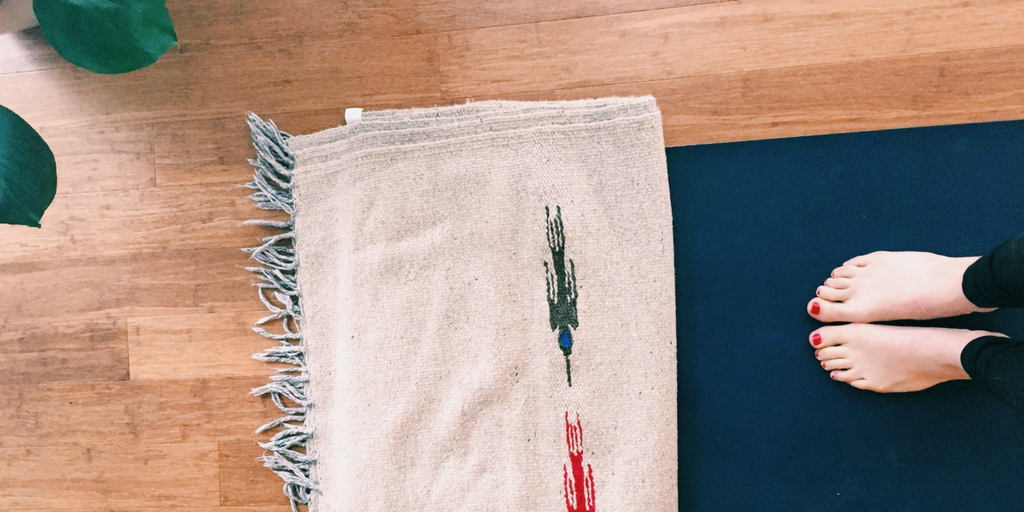Natural Relief For Teeth Grinding

Grinding and clenching our teeth is one the most common reactions to chronic, low-level stress – the kind of stress we all experience when it comes to dealing with our health, managing our families and kids, and just going to work every day.
If you’re grinding and clenching your teeth, you’re not alone.
It’s something I struggled with for years after my Mom lost her long battle with cancer.
So, what can we do about it?
That’s where this article from Christina comes in.
Christina Tidwell is a Registered Nurse and Autoimmune Health Coach. After an autoimmune diagnosis of her own, Christina dedicated her practice to helping those with autoimmune health problems heal holistically, using a blend of both naturopathic and Western approaches. She is also one of our recommended health practitioners for anyone in our community who needs more guidance and 1-on-1 support.
If you’re already working with a dentist and using a bite splint, but still need more help, this article is here to support you.
And today, Christina has shared a comprehensive guide to stop teeth grinding and clenching naturally – without resorting to bulky mouthguards or potentially dangerous muscle relaxants.
[Enter Christina]
I am a teeth grinder. And if you’ve ever woken up with a sore jaw and headache, are unable to relax your jaw during the day, or have had a sleeping partner wake you up to say “stop making that horrible death sound with your mouth,” then you might be, too.
My clenching and grinding peaked to a whole new level with the stress and anxiety of getting through nursing school. I frequently woke up with raging headaches and tension that spread all the way down my neck.
After a chipped molar and months of unrelenting jaw pain, I finally went to a doctor for guidance. The only solution he offered me was to take a sedative muscle relaxant to relax my jaw and relieve the pain. Muscle relaxants gave me some relief but left me in a sleepy, foggy state (which was not going to work for me when I was trying to pass my nursing finals). So, what was I supposed to do?
If It Doesn’t Work For You, Seek Out Alternatives
Refusing to believe that hardcore muscle relaxants could be my only option, I did what I now know to be crucial to my own health and well being: I went and did my own research.
I don’t mean Googling my collection of symptoms on the internet, diagnosing myself with incurable jaw cancer and looking for the best jaw cancer specialist in Seattle kind of research. Instead, I went looking for reliable alternatives that fit better with my own personal health needs.
In this particular case, I consulted a pharmacist at a local drug store to get more information about alternatives to muscle relaxants. After I explained my symptoms, he immediately handed me an over-the-counter magnesium supplement and instructed me to take the recommended amount daily.
Replenishing my body with magnesium had amazing effects and I noticed my jaw relaxing and the pain and headaches significantly reducing within a week. It was also a whole lot gentler on my body than the muscle relaxants were.
What Does Magnesium Have To Do With Teeth Grinding?
Magnesium is a dietary mineral utilized in the human body to carry out over 300 biochemical reactions required to keep our bodies functioning optimally, so it’s no surprise that it affects so many of our bodily systems. In particular, magnesium is essential for regulating our nervous, muscular and cardiovascular systems. It affects our:
- Heart rhythm
- Vascular tone
- Nerve function
- Muscle contraction and relaxation
Just think of magnesium as a naturally occurring muscle relaxer in our bodies. It has beneficial effects for regulating the nervous system and contributing to normal muscle function. Deficiencies of magnesium have also been associated with the following conditions:
Where Do I Get Magnesium From?

1) Food
Ideally, we get magnesium from our diets by eating foods like dark leafy greens, nuts and seeds, fish, avocados, bananas, whole grains and beans. The recommended daily allowance (RDA) according to the National Institute of Health for magnesium ranges from 360mg – 420mg per day based on gender and age.
Our modern day diets, however, often lack adequate amounts of magnesium due to the type of foods we are eating, as well as mineral depletion of the soil that may be resulting in lowered levels of magnesium in our food. A 2005 study of US adults showed 68% consumed less than the RDA of magnesium, and 19% consumed less than 50% of the RDA.
You can see how many of us might not be getting enough of this vital mineral.
Additionally, some individuals may not absorb magnesium properly due to digestive disorders or a damaged digestive tract. Moving towards a real, whole foods diet, upping your intake of leafy greens and optimizing digestion are the best ways to incorporate more magnesium through food.
2) Supplements
If you are unable to achieve an adequate magnesium intake through food sources, it can be a good idea to supplement your diet (especially if you’re a teeth grinder).
Look specifically for magnesium citrate, chelate, malate, threonate, or glycinate and avoid magnesium oxide as it is poorly absorbed and usually the cheapest form found in supplements.
I personally use Natural Calm powder.
Magnesium is a safe supplement but it’s not for everyone, so consult your doctor before starting to take supplements especially if you have heart disease or kidney problems to make sure it works with your health needs and current medication regime. Magnesium can interact with some medications, so it’s important to first check with a medical practitioner to see if it’s a safe choice for you.
In general, it’s a good idea to start with 200 to 400 mg of magnesium taken at bedtime. For me, it was important to take magnesium religiously to get the muscle relaxant effects.
Too much magnesium from food is not a risk in healthy individuals, because the kidneys eliminate excess amounts in the urine. However, high doses of magnesium from dietary supplements can cause loose stools that can be accompanied by nausea and abdominal cramping. If you experience these symptoms, just dial back the dose.
Getting To The Root Cause Of Teeth Grinding
Teeth grinding is not simply a standalone symptom of magnesium deficiency. As is the case with every health issue, it’s important to get to the root cause of the problem and identify all areas where imbalance is occurring.
Magnesium is just one thing to consider adding in your routine to help relax your muscles and give you relief. But if there are other underlying issues, it may not be the “magic bullet.” Another key component in reducing teeth grinding is addressing stress.
Stress And Teeth Grinding
Do you notice your jaw clenching and your muscles tensing up the more stressed out you are? I do.
Researchers report that stress is the most significant factor in predicting the frequency and severity of teeth grinding.
It’s somewhat of a vicious cycle, too, because teeth grinding behaviors are actually thought to directly impact the levels of stress hormones and responses in the human body.
Researchers found that the natural expression of aggression, through clenching and grinding teeth, regulates stress in the same way that a shout or scream can ease tension or fear.
We grind because we’re stressed, and we’re stressed because we grind. Oof! So how do we break the cycle?
This Is Your Body On Stress
When our bodies are under stress, we activate the sympathetic nervous system or “fight or flight response.” You know, the one where our bodies are primed to run from predators in the jungle who are trying to eat us.
Stress hormones like adrenaline, cortisol, and norepinephrine are pumped through the body and we experience an increase in heart rate, blood pressure and respiratory rate, as well as a surge of glucose for quick energy. Once the threat is gone, however, these hormones are supposed to turn off and our bodies should return to the parasympathetic or “rest and digest” state.
Our bodies respond to all types of stressors by activating the sympathetic response, regardless of the source. Our nervous system can’t tell the difference between a predator and a stressful day at the office!
The majority of the stress we experience in today’s world does not come from a lion chasing us in the jungle, but rather from chronic stressors like demanding jobs, deadlines, family issues, health problems, lack of sleep and financial struggles. All of these daily stressors have been found to correlate with increased teeth grinding.
Since we are constantly exposed to this type of stress, the threat never “turns off” and we find ourselves in a perpetual, low-level stress response day in and day out.
Where Do You Measure Up?
On a scale of 1 to 10, what is your average stress level on a daily basis?
When I was getting through nursing school, I would have rated my stress level a solid 9/10 every single day. It’s no wonder I was feeling this stress in my body and jaw.
If your stress level is anywhere from a 5 or more, it’s a good indicator that you are walking around with a lot of unmanaged stress that could be contributing to your jaw clenching and teeth grinding.
Stress is not going to magically disappear, and we will always have life events that stress us and test us. This is ok and means that we are human. This does not mean, however, that we must live in a constant state of chronic, unmanaged stress.
Stress Management Techniques

Don’t worry, I’m not going to tell you to take a bubble bath and go to the spa to solve all of your problems (although that does sound really nice). There are real and tangible ways to begin the process of managing stress and reducing it’s impact in our lives.
Step 1: Tune In
The first step is to pay attention to times throughout the day when you react by tensing up your jaw, neck and shoulders. Sometimes we aren’t even aware that our bodies are responding in this way. Research has even shown us that not dealing with daily stressors head-on increases the likelihood of tooth damage and facial pain in those that grind their teeth.
By bringing mindful attention to our bodies, we can identify how we are reacting to stress and understand what people, places, and events trigger us so we can begin to manage it.
I take one minute prior to each meal to scan my body and notice what I’m feeling. Is my jaw tense and sore? Do I have a headache? Am I breathing deeply? How stressed am I on a scale of 1 to 10?
It helps to have these quick check-ins to better connect to my body. By bringing awareness to your body’s response to stress, you can take moments throughout the day to consciously relax and retrain your muscles.
Step 2: Say No
Most of us are really busy balancing families, jobs, social lives and an endless to-do list. The thought of adding in stress management techniques might sound like just one more thing you have to accomplish during the day.
Instead, try simplifying and taking things out. Look at your calendar for the next week. Is there anything that immediately gives you anxiety or stress just thinking about it? Is there anyway you can say no to that event and make some time and space in your life? At work, are there tasks you can delegate to others to free up some time for yourself?
Your first reaction might be, “No way lady! I can’t get out of anything. Who else would do it?” That’s ok. Just continue to consider how you can honor yourself and your boundaries by not stretching yourself too thin. This is a beautiful act of self-care.
Step 3: Activate The Relaxation Response
In order to get out of the sympathetic state and into the parasympathetic state, we have to activate what’s known as our “Relaxation Response.”
The term “Relaxation Response” was coined by Dr. Herbert Benson, the founder of Harvard’s Mind/Body Medical Institute. He describes the Relaxation Response as a physical state of deep relaxation, which engages the other part of our nervous system – the parasympathetic nervous system. This helps us move away from a state of chronic, low-level stress and gives our bodies the opportunity to restore and heal.
3 Ways To Activate The Relaxation Response
1) 4-7-8 Breathing: This is my favorite method and one I use daily. Watch my video here for a guide on how to do this simple breathing technique.
2) Meditation: Sitting in stillness and breathing for 10 minutes a day can help to elicit the relaxation response. I love using an app like Calm or Headspace for guidance.
3) Doing something you love: According to Dr. Benson, “Anything that breaks the train of everyday thought will evoke this physiological state.” Try activities you enjoy like walking, yoga, knitting, or even playing an instrument.
The pressure that grinding and clenching puts on your jaw is akin to having a sprained ankle, meaning it has to gradually heal overtime. In addition to considering magnesium and implementing stress management techniques, you can reduce tension by applying warm compresses to your jaw at night to relax your muscles.
So, give these techniques a try. Your teeth (and sleeping partner) will thank you.
[Enter Jordan]
What I love about this article is that it addresses both the symptoms of teeth grinding (using magnesium to help relax the muscles) and one of the root causes – stress.
There are several other root causes you may want to investigate, but starting here is the easiest and cheapest. You may also want to consider working with a holistic dentist to be fitted for a bite splint, too. For more information on that, check out these podcasts.
This is just one example of how Christina blends her Western and holistic medical training to help her clients!
If you want to learn more about Christina or our other recommended practitioners, go here.
You can also learn more about Christina’s nutrition coaching practice, Live Well with Christina and follow her on Facebook or Instagram.
Make sure you download her free 7-Day Clean Eating Meal Plan, too.
– Jordan
Did You Like this Article?
Subscribe to our newsletter to receive email notifications, some ways to find relief, and next steps.

